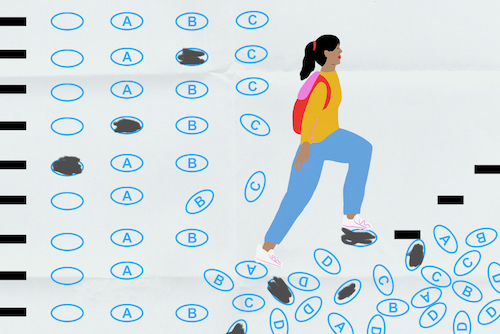Like with everything else in life, there's always a choice, including whether or not you sit the SAT or ACT examinations. Especially now as many colleges are shifting to 'test-optional' admissions processes.
With the onset of the COVID-19 pandemic in 2020, we say the largest number of US colleges and universities in history transition to 'test optional' admissions. Why? Because the SATs are the more common exam, and they are only offered in person. A couple of schools however had stated in 2020 that they would only be going 'test optional' for one or two admissions cycles - but no one could have predicted the longevity of this pandemic.
As we now approach the college application season for the Class of 2023 (really, the Class of 2027 in college lingo), we can safely reassess the situation and make more updated predictions on standardized testing in the years to come... with the most notable change being that the
SAT is going digital.
WHAT DOES TEST-OPTIONAL EVEN MEAN?
Test-optional means... exactly what it sounds like. Schools with test-optional admissions processes allow students to apply to college without providing SAT and / or ACT scores for consideration. These schools still consider test grades if they are submitted; but, give equal or greater consideration to other aspects of the prospective student's application.
Once upon a time, the only option was to do the SATs and submit your scores. It was the United States' version of a matriculation exam (like CSEC / CAPE in the Caribbean or O / A Levels in the UK). The decision to go 'test optional' came about as schools recognised that vast disparity between SAT performance across the various socioeconomic classes, racial backgrounds and other various intersectionalities. This realisation prompted an attempt by some schools to be more inclusive and create opportunities for enrolment for underrepresented and disadvantaged groups. And then, again, as COVID-19 upended our lives, several exam centres were shut down - making access to SAT and ACT exams so much more difficult - and colleges adapted by eliminating the SAT / ACT score criterion.
According to the National Association for College Admission Counselling, a whopping 1450 colleges and universities in the USA transitioned to test-optional college admissions processes. You can view a list of test optional schools
here.
UNDERSTANDING ADMISSIONS CLASSIFICATIONS
A college or university can be classified as:
BUT HOW OPTIONAL IS OPTIONAL?
According to recent data... it's not so optional if you want to be considered for financial aid and scholarships. And it's especially not so optional if your eyes are on those super competitive schools - like Ivy Leagues and strong Liberal Arts colleges.
Only 7.35% of applicants who did not submit standardized test scores were admitted to Georgetown University in the 2020-2021 early admission season. At the University of Virginia, only 28% of all accepted students for the Class of 2025 did not submit standardized test scores, even though 42% of all applicants chose to not submit a score. At Brown University in that same year, though the number is relatively high, less than half of the Class of 2025 did not submit SAT scores (42%).
Despite colleges saying that not reporting a test score won't negatively affect your chances of getting in under test optional admissions, the numbers show that there is a favour for applicants who do submit when given the option.
The AIM Online Academy strongly recommends that those who are able to sit the SAT exams do. Why? Here are some FACTS:
In essence, the college application space is biased towards standardised test results, so the best advice we could possibly give is this: If you CAN take the SATs, take them. This ensures that when you're applying, especially to colleges that are test-optional and test-flexible, your application has a lot more weight. PLUS... and we can't stress this enough... not taking the SAT/ACT exams, prevents you from accessing financial aid.
If you are in the Class of 2023, you want to be preparing to sit the SAT at least TWICE before October 2022 to get ahead of ALL deadlines and maximize your chances of superscoring and meeting EARLY deadlines (especially for scholarships)!


